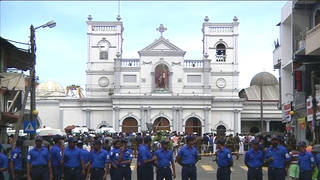Sri Lankan Gov't Responds to Unprecedented Attacks with Surveillance, Social Media Blackout, Curfew

In one of the worst terrorist attacks to hit South Asia, Sri Lankan government officials say a local Islamist extremist group called the National Thowheed Jama'ath coordinated a series of eight bombings on Easter Sunday at churches and luxury hotels throughout the country. The attacks killed at least 290 people, injured more than 500 and left behind scenes of carnage and chaos. The government has apologized for not taking more preventative measures. Sri Lanka's telecommunications minister said a government memo circulated by Sri Lanka's top police official 10 days earlier warned of a possible attack, but that the warning was ignored. Officials have forced the country of 21 million people to go on a dawn-to-dusk curfew, and blocked many social media networks in the wake of terrorist attacks. We go to the capital, Colombo, for an update from Bhavani Fonseka, senior researcher with the Centre for Policy Alternatives. "The discrimination, the targeting and the ethnic tensions have been there for decades," says Fonseka. "This was most evident during the [Sri Lankan civil] war, but this has continued postwar, as well." We are also joined by Alan Keenan, Sri Lanka project director at the International Crisis Group, and T. Kumar, former international advocacy director for Amnesty International USA. Kumar was a political prisoner for over five years in his native Sri Lanka.